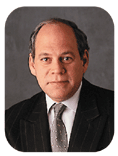Laurence Moskowitz
Laurence (Larry) Moskowitz is the President, Chief Executive and Chairman of the Board of Medialink Worldwide. Moskowitz owns over 551,089 Medialink shares, representing 8.88% of the company stock. According to corporate reports filed with the U.S. Securities and Exchange Commission in 2004 Moskowitz was paid just over $334,000 as salary with a further $15,000 in shares. [1]
Moskowitz is a graduate of the Journalism School at Pennsylvania State University and was a professor of investigative journalism at Temple University. Moskowitz worked as a reporter and editor at United Press International and later as a foreign correspondent. In 1986 he founded Medialink.
His biographical note states that "soon after Medialink's inception, he worked closely with the Radio-Television News Directors Association to establish a code of ethics based on full disclosure relating to the production and distribution of VNRs and other broadcast publicity tools".[2]
- Director, Jewish Community Federation
Reaction to controversy over VNR's
In response to a major New York Times article on U.S. government use of VNR's the PR trade publication, O'Dwyers PR Daily, convened a teleconference of leading VNR company representatives to discuss "what the industry can do about the torrent of negative publicity". [3]
In his opening comments to the teleconference Moskowitz stressed that in his view "the government has a responsibility to advise, educate, inform and warn the public and that it has every right to communicate as any other entity would". [4]
Moskowitz also revealed that in the aftermath of the New York Times story Medialink had had discussions with "former GAO officials" and with the White House. Medialink, he said, had adopted the position of staying out of the debate between the Government Accountability Office and the Justice Department over disclosure standards that should apply to VNRs preferring instead "to just say whatever the highest standard is we're happy to meet".
Moskowitz was dismissive of the media and public reaction to the New York Times story recalling that it reminded him of when TV Guide featured a story on its cover in the early 1990's. "...This is kind of like people walking into a big building that's labeled casino and being shocked to find out there's gambling going in there," he said.
As for the best strategy for the industry, Moskowitz was determined that any concessions in increased identification in VNR's should be confined only to government funded VNR's. "Let's remember this debate, from everything I've seen, read, heard, and talked to, is purely the government ... And I'm glad the story is kind of focused there, because I would hate to see it broaden," he said.
The issue as Moskowitz saw it was whether there should "be identification within the body of the narration, and/or the script, and/or super?". Moskowitz stated that VNR producers already identified the sponsor of the project in the text advisory that was sent to producers and on the slates incorporated at the beginning and end of each release.
The question was what else should be done. A Council of Public Relations firms suggestion that each frame of the VNR should include an identifying logo in the botton right hand corner (referred to in the industry as a 'bug') he dismmissed as "totally and completely impractical".
"I think it would diminish the use by broadcasters. I think it would be pointless to viewers, and if any broadcaster wanted to use the thing, they probably cover it over with their own bug and might automatically do so," he argued.
Another possibility, he noted, was to ensure that the concluding comments by the 'reporter' identified the sponsor possibily in conjunction with an intermittent on-screen identifier. Moskowitz was equally sceptical about this too dismissing it as "practically impossible".
Reporting on a a September 2005 seminar on new media, Media Daily News noted that VNRs "which can look like regular news stories to the unaided eye--can be placed in local or national newscasts. Moskowitz told the seminar that "If there is news in your brands we'll find a way to put your brands in your news. In a sense, it's product placement, but it's earned a place on the shelf." [5]
Other SourceWatch resources
External links
- "Laurence Moskowitz: President, Chief Executive and Chairman of the Board", Medialink, accessed March 2005.
- "Form DEF14A: Official information to shareholders of matters to be brought to a vote (Proxy): Medialink Worldwide, Filed: April 28, 2004. (Note this statement covers the period to June 30, 2004.
- "Transcript to VNR Teleconference", O'Dwyers PR Daily, March 17, 2005. (Sub req'd).
- Wayne Friedman, "[http://publications.mediapost.com/index.cfm?fuseaction=Articles.showArticleHomePage&art_aid=34517
New and Emerging Media: Not Just About Branded Entertainment]", Media Daily News, September 27, 2005.
